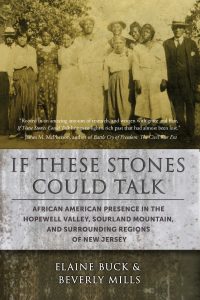The Birth of a Book

Researched and Written by Stoutsburg Board Members, Beverly Mills and Elaine Buck
A decade ago, Beverly Mills and Elaine Buck began formal collaboration into researching the lives of their African American ancestors, most of whom were likely to have been brought up the Delaware River as slaves to–what is now the Hopewell Valley region in Central New Jersey.
Part of Mills’ and Bucks’ mission was to vocalize not just the hardships and stark realities that so many blacks had faced as slaves and then “apprentices” in the State of New Jersey, but also underline the thriving communities, loyal soldiers and wounded veterans, committed churches and very real economic contributions of their ancestors that, without their efforts, were likely to be forgotten in local history accounts.
Active community members, Mills and Buck both serve on the board of the Stoutsburg Cemetery Association, a burial ground for African American residents and veterans in the region. In April of 2006, Mills and Buck received a panicked call to help prevent construction plans for another sacred slave burial ground in the region. That call and their subsequent struggles to preserve the site both galvanized and energized their plans and efforts to chronicle the lives of their ancestors in print and digital form.
“I want the public to know how and why the land at Stoutsburg Cemetery was purchased—so that blacks would have a place to be buried with dignity,” explains Buck. “There are veterans from all theaters of war buried there. It gives me great honor to research the Revolutionary War veteran memorial marker for Private William Stives, and the clearly marked Civil War Veteran’s graves, along with my ancestor, Jesse Barksdale who served in WWI in the 807th Pioneer Infantry, as did Oscar Hodnett also from Hopewell.”
For both authors, a fire was lit long before they gathered boxes of research, sat for hours with local elders, obtained property deeds or dug into church records and runaway slave notices from the 18th century. As young girls searching for an understanding of their identity in school, they usually felt horrified at textbook historical accounts that whitewashed the reality of slavery in New Jersey–or portrayed “happy” servants at the beck and call of white households.
In fact, Buck, along with a colleague at Hopewell Valley High School named Michelle Clark (who later graduated from Princeton University and became VP of Black Family Channel) founded the Black Culture Club at Hopewell Valley High School.
Mills immersed herself in local history, listening to the stories of her grandmother about “life on the mountain.”
“As far back as I can remember I’ve always had a love of history and a reverence for “old things,” Mills reflects.
“I listened intently to what the old-timers used to talk about and tried to commit as much as I could to memory; they were the keepers of the stories…How can we not share information about a thirteen-year-old Friday Truehart who had to leave his mother and the only environment he knew to come north from Charleston, South Carolina with his Master, the Reverend Oliver Hart?”
“To be able to read the actual will of Reverend Hart where he “bequeaths into my son John Hart, one Negro man named Friday; also my watch, with the chain and seal, likewise a silver soup spoon and a silver pepper box, together with a seal set in gold on which our family coat of arms is engraven; to him and to his heirs forever. The public needs to know about descendants, such as myself, who have come from people who were listed as possessions along with their watches, spoons and pepper boxes proudly bearing the family crest. We are not talking about the descendants of people who toiled in Deep South cotton fields. We are talking about descendants still living in one of the wealthiest communities in the State of New Jersey; Hopewell Township.”
Through many years of research, the examination of records and verbal testimonies, Mills and Buck are writing a book with the editorial consultation and expertise of Wild River Consulting & Publishing, based out of Princeton, New Jersey. The book aims to provide a clearer understanding of the African American experience and accomplishments in Hopewell Valley (and surrounding area) to be used as an addendum to the little known, missing black history facts left out of our family histories, our textbooks, and libraries. The goal is to engage readers–and educate students–not only in New Jersey but across America and beyond.

If These Stones Could Talk was published in November 2018, and celebrated with a book launch at Grounds For Sculpture in Hamilton, New Jersey. Click here for more information and to purchase a copy.
